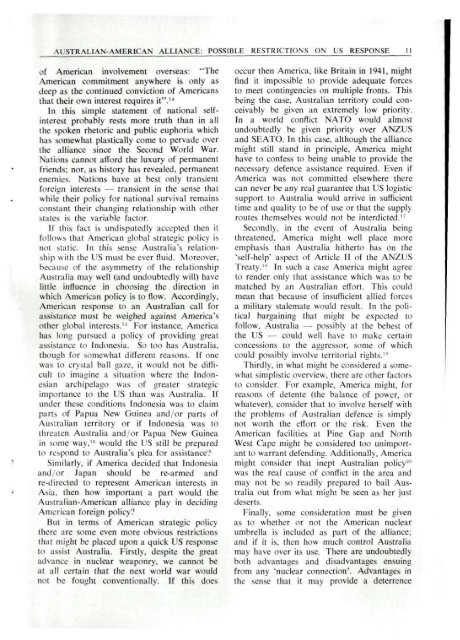ISSUE 3 : Mar/Apr - 1977 - Australian Defence Force Journal
ISSUE 3 : Mar/Apr - 1977 - Australian Defence Force Journal
ISSUE 3 : Mar/Apr - 1977 - Australian Defence Force Journal
You also want an ePaper? Increase the reach of your titles
YUMPU automatically turns print PDFs into web optimized ePapers that Google loves.
AUSTRALIAN-AMERICAN ALLIANCE: POSSIBLE RESTRICTIONS ON US RESPONSE IIof American involvement overseas: "TheAmerican commitment anywhere is only asdeep as the continued conviction of Americansthat their own interest requires it". 14In this simple statement of national selfinterestprobably rests more truth than in allthe spoken rhetoric and public euphoria whichhas somewhat plastically come to pervade overthe alliance since the Second World War.Nations cannot afford the luxury of permanentfriends: nor, as history has revealed, permanentenemies. Nations have at best only transientforeign interests — transient in the sense thatwhile their policy for national survival remainsconstant their changing relationship with otherstates is the variable factor.If this fact is undisputedly accepted then itfollows that American global strategic policy isnot static. In this sense Australia's relationshipwith the US must be ever fluid. Moreover,because of the asymmetry of the relationshipAustralia may well (and undoubtedly will) havelittle influence in choosing the direction inwhich American policy is to flow. Accordingly.American response to an <strong>Australian</strong> call forassistance must be weighed against America'sother global interests.'' For instance, Americahas long pursued a policy of providing greatassistance to Indonesia. So too has Australia.though for somewhat different reasons. If onewas to crystal ball gaze, it would not be difficultto imagine a situation where the Indonesianarchipelago was of greater strategicimportance to the US than was Australia. Ifunder these conditions Indonesia was to claimparts of Papua New Guinea and /or parts of<strong>Australian</strong> territory or if Indonesia was tothreaten Australia and/or Papua New Guineain some way," 5 would the US still be preparedto respond to Australia's plea for assistance?Similarly, if America decided that Indonesiaand/or Japan should be re-armed andre-directed to represent American interests inAsia, then how important a part would the<strong>Australian</strong>-American alliance play in decidingAmerican foreign policy?But in terms of American strategic policythere are some even more obvious restrictionsthat might be placed upon a quick US responseto assist Australia. Firstly, despite the greatadvance in nuclear weaponry, we cannot beat all certain that the next world war wouldnot be fought conventionally. If this doesoccur then America, like Britain in 1941, mightfind it impossible to provide adequate forcesto meet contingencies on multiple fronts. Thisbeing the case, <strong>Australian</strong> territory could conceivablybe given an extremely low priority.In a world conflict NATO would almostundoubtedly be given priority over ANZUSand SEATO. In this case, although the alliancemight still stand in principle, America mighthave to confess to being unable to provide thenecessary defence assistance required. Even ifAmerica was not committed elsewhere therecan never be any real guarantee that US logisticsupportto Australia would arrive in sufficienttime and quality to be of use or that the supplyroutes themselves would not be interdicted. 17SecondK. in the event of Australia beingthreatened. America might well place moreemphasis than Australia hitherto has on the'self-help' aspect of Article II of the ANZUSTreaty.'" In such a case America might agreeto render only that assistance which was to bematched by an <strong>Australian</strong> effort. This couldmean that because of insufficient allied forcesa military stalemate would result. In the politicalbargaining that might be expected tofollow, Australia — possibly at the behest ofthe US — could well have to make certainconcessions to the aggressor, some of whichcould possibly involve territorial rights.'"Thirdly, in what might be considered a somewhatsimplistic overview, there are other factorsto consider. For example, America might, forreasons of detente (the balance of power, orwhatever), consider that to involve herself withthe problems of <strong>Australian</strong> defence is simplynot worth the effort or the risk. Even theAmerican facilities at Pine Gap and NorthWest Cape might be considered too unimportantto warrant defending. Additionally, Americamight consider that inept <strong>Australian</strong> policy-"was the real cause of conflict in the area andmay not be so readily prepared to bail Australiaout from what might be seen as her justdeserts.Finally, some consideration must be givenas to whether or not the American nuclearumbrella is included as part of the alliance;and if it is, then how much control Australiamay have over its use. There are undoubtedlyboth advantages and disadvantages ensuingfrom any 'nuclear connection". Advantages inthe sense that it may provide a deterrence
















